美化html表格主要通過css實(shí)現(xiàn),關(guān)鍵步驟包括:1.使用border-collapse合并邊框、設(shè)置表格寬度和字體;2.為表頭添加背景色、加粗和內(nèi)邊距;3.為單元格設(shè)置邊框、內(nèi)邊距和文本對(duì)齊方式;4.利用nth-child選擇器實(shí)現(xiàn)行的交替背景色和懸停效果;5.添加圓角、陰影等視覺增強(qiáng)效果;響應(yīng)式設(shè)計(jì)可通過overflow-x:auto實(shí)現(xiàn)水平滾動(dòng)或媒體查詢堆疊單元格;復(fù)雜布局可用css grid定義行列結(jié)構(gòu)或flexbox創(chuàng)建行列容器;交互功能如排序需監(jiān)聽表頭點(diǎn)擊并重排數(shù)據(jù)、篩選需綁定輸入框事件過濾內(nèi)容、分頁需按頁碼顯示指定數(shù)量行并生成頁碼按鈕。
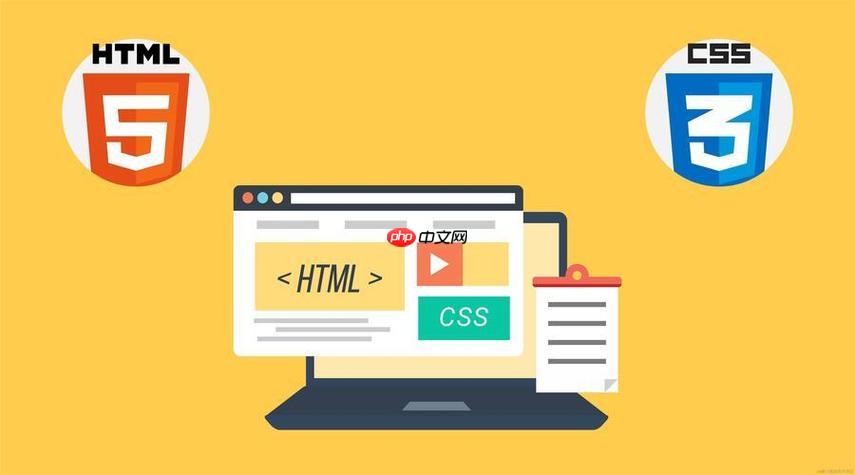
美化HTML表格,關(guān)鍵在于使用CSS。通過CSS,你可以控制表格的顏色、字體、邊框、間距等等,讓表格不再單調(diào)。
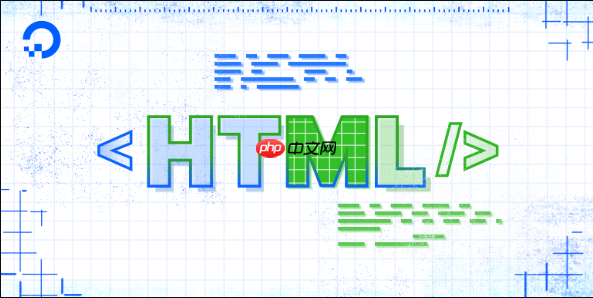
解決方案:
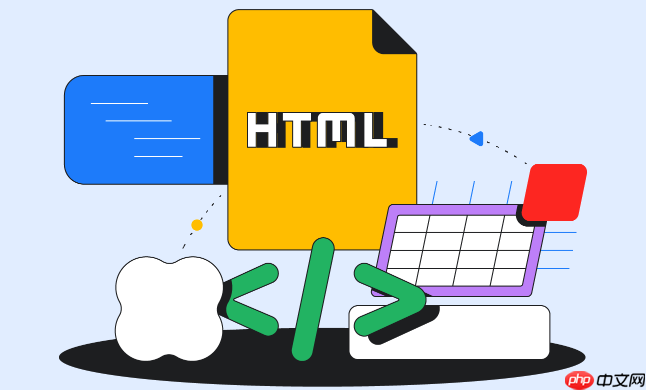
美化HTML表格主要通過CSS來實(shí)現(xiàn),以下是一些關(guān)鍵的css屬性和技巧:
立即學(xué)習(xí)“前端免費(fèi)學(xué)習(xí)筆記(深入)”;
1. 基本樣式:

- border-collapse: collapse;:合并表格邊框,避免雙線邊框。
- width: 100%;:讓表格寬度適應(yīng)容器。
- font-family: Arial, sans-serif;:設(shè)置字體。
- font-size: 14px;:設(shè)置字體大小。
示例:
table { border-collapse: collapse; width: 100%; font-family: Arial, sans-serif; font-size: 14px; }
2. 表頭樣式:
- background-color: #f2f2f2;:設(shè)置背景顏色。
- font-weight: bold;:加粗字體。
- text-align: left;:左對(duì)齊文本。
- padding: 8px;:設(shè)置內(nèi)邊距。
示例:
th { background-color: #f2f2f2; font-weight: bold; text-align: left; padding: 8px; }
3. 表格單元格樣式:
- border: 1px solid #ddd;:添加邊框。
- padding: 8px;:設(shè)置內(nèi)邊距。
- text-align: left;:左對(duì)齊文本。
示例:
td { border: 1px solid #ddd; padding: 8px; text-align: left; }
4. 行樣式:
- &:nth-child(even) {background-color: #f9f9f9;}:偶數(shù)行背景色。
- &:hover {background-color: #ddd;}:鼠標(biāo)懸停效果。
示例:
tr:nth-child(even) { background-color: #f9f9f9; } tr:hover { background-color: #ddd; }
5. 其他樣式:
- border-radius: 5px;:圓角邊框。
- box-shadow: 2px 2px 5px rgba(0, 0, 0, 0.1);:陰影效果。
- text-shadow: 1px 1px 2px rgba(0, 0, 0, 0.1);:文字陰影。
示例:
table { border-radius: 5px; box-shadow: 2px 2px 5px rgba(0, 0, 0, 0.1); } th, td { text-shadow: 1px 1px 2px rgba(0, 0, 0, 0.1); }
如何讓表格在不同屏幕尺寸下保持良好的顯示效果?
響應(yīng)式表格的關(guān)鍵在于處理表格內(nèi)容的溢出。通常,在小屏幕上,表格會(huì)超出容器寬度,導(dǎo)致水平滾動(dòng)條。以下是一些解決方案:
-
使用overflow-x: auto;: 將表格包裹在一個(gè)
中,并設(shè)置該的overflow-x屬性為auto。這會(huì)在表格內(nèi)容超出容器寬度時(shí)顯示水平滾動(dòng)條。<div style="overflow-x:auto;"> <table> <!-- 表格內(nèi)容 --> </table> </div>
堆疊單元格: 使用CSS媒體查詢,在小屏幕上將表格單元格堆疊顯示。這需要修改表格的結(jié)構(gòu)和樣式。
@media screen and (max-width: 600px) { table { width: 100%; } thead { display: none; /* 隱藏表頭 */ } tr { margin-bottom: 15px; display: block; /* 使行成為塊級(jí)元素 */ border: 1px solid #ddd; } td { display: block; /* 使單元格成為塊級(jí)元素 */ text-align: right; /* 可選:右對(duì)齊文本 */ border-bottom: 1px dotted #ddd; } td:before { content: attr(data-label); /* 顯示表頭內(nèi)容 */ float: left; font-weight: bold; text-transform: uppercase; } td:last-child { border-bottom: 0; } }HTML需要添加data-label屬性:
<table> <thead> <tr> <th>Name</th> <th>Age</th> <th>City</th> </tr> </thead> <tbody> <tr> <td data-label="Name">John Doe</td> <td data-label="Age">30</td> <td data-label="City">New York</td> </tr> <tr> <td data-label="Name">Jane Smith</td> <td data-label="Age">25</td> <td data-label="City">London</td> </tr> </tbody> </table>
使用JavaScript庫: 像DataTables這樣的JavaScript庫可以自動(dòng)處理表格的響應(yīng)式問題,并提供排序、搜索等功能。
如何使用CSS Grid或Flexbox來創(chuàng)建更復(fù)雜的表格布局?
雖然傳統(tǒng)的
元素主要用于展示表格數(shù)據(jù),但CSS Grid和Flexbox提供了更靈活的布局選項(xiàng),可以用來創(chuàng)建更復(fù)雜的“表格”布局,尤其是在數(shù)據(jù)展示不需要嚴(yán)格的表格語義時(shí)。
1. 使用CSS Grid:
CSS Grid允許你定義行和列,并將元素放置在網(wǎng)格中。這非常適合創(chuàng)建復(fù)雜的布局,例如帶有固定列頭或列的表格。
<div class="grid-container"> <div class="grid-item header">Header 1</div> <div class="grid-item header">Header 2</div> <div class="grid-item">Data 1</div> <div class="grid-item">Data 2</div> </div>
.grid-container { display: grid; grid-template-columns: auto auto; /* 定義兩列 */ grid-gap: 10px; /* 列和行之間的間距 */ background-color: #f2f2f2; padding: 10px; } .grid-item { background-color: white; border: 1px solid #ddd; padding: 20px; font-size: 16px; text-align: center; } .header { font-weight: bold; background-color: #ddd; }2. 使用Flexbox:
Flexbox主要用于一維布局,但也可以用來創(chuàng)建類似表格的布局。你可以使用display: flex和flex-direction: column來創(chuàng)建列,然后使用flex-direction: row來創(chuàng)建行。
<div class="flex-container"> <div class="flex-row header"> <div class="flex-item">Header 1</div> <div class="flex-item">Header 2</div> </div> <div class="flex-row"> <div class="flex-item">Data 1</div> <div class="flex-item">Data 2</div> </div> </div>
.flex-container { display: flex; flex-direction: column; /* 創(chuàng)建列 */ } .flex-row { display: flex; flex-direction: row; /* 創(chuàng)建行 */ } .flex-item { background-color: white; border: 1px solid #ddd; padding: 20px; font-size: 16px; text-align: center; flex: 1; /* 平均分配空間 */ } .header { font-weight: bold; background-color: #ddd; }選擇哪個(gè)?
- CSS Grid: 更適合復(fù)雜的二維布局,例如需要精確控制行和列的位置和大小。
- Flexbox: 更適合一維布局,例如創(chuàng)建水平或垂直的列表。
如何添加交互效果,例如排序、篩選和分頁?
添加交互效果通常需要結(jié)合JavaScript。以下是一些基本思路:
-
排序:
- 為表頭添加點(diǎn)擊事件監(jiān)聽器。
- 點(diǎn)擊表頭時(shí),使用JavaScript對(duì)表格數(shù)據(jù)進(jìn)行排序。
- 更新表格的dom,重新渲染排序后的數(shù)據(jù)。
const table = document.querySelector('table'); const headers = table.querySelectorAll('th'); const tableBody = table.querySelector('tbody'); headers.forEach(header => { header.addEventListener('click', () => { const column = header.cellIndex; const rows = Array.from(tableBody.querySelectorAll('tr')); const sortedRows = rows.sort((a, b) => { const aValue = a.querySelectorAll('td')[column].textContent.trim(); const bValue = b.querySelectorAll('td')[column].textContent.trim(); return aValue.localeCompare(bValue); // 字符串比較 }); // 移除舊的行 rows.forEach(row => tableBody.removeChild(row)); // 添加排序后的行 sortedRows.forEach(row => tableBody.appendChild(row)); }); }); -
篩選:
- 添加輸入框或選擇框,用于輸入篩選條件。
- 監(jiān)聽輸入框或選擇框的change事件。
- 使用JavaScript過濾表格數(shù)據(jù)。
- 更新表格的DOM,只顯示符合條件的數(shù)據(jù)。
const filterInput = document.getElementById('filter'); filterInput.addEventListener('keyup', () => { const filterValue = filterInput.value.toLowerCase(); const rows = tableBody.querySelectorAll('tr'); rows.forEach(row => { const rowText = row.textContent.toLowerCase(); if (rowText.includes(filterValue)) { row.style.display = ''; } else { row.style.display = 'none'; } }); }); -
分頁:
- 將表格數(shù)據(jù)分成多個(gè)頁面。
- 創(chuàng)建分頁控件(例如,上一頁、下一頁按鈕,頁碼)。
- 監(jiān)聽分頁控件的點(diǎn)擊事件。
- 根據(jù)當(dāng)前頁碼,只顯示對(duì)應(yīng)頁面的數(shù)據(jù)。
const rowsPerPage = 10; let currentPage = 1; const rows = Array.from(tableBody.querySelectorAll('tr')); const totalPages = Math.ceil(rows.length / rowsPerPage); const pagination = document.getElementById('pagination'); function displayRows(page) { const start = (page - 1) * rowsPerPage; const end = start + rowsPerPage; rows.forEach((row, index) => { if (index >= start && index < end) { row.style.display = ''; } else { row.style.display = 'none'; } }); } function createPaginationButtons() { for (let i = 1; i <= totalPages; i++) { const button = document.createElement('button'); button.textContent = i; button.addEventListener('click', () => { currentPage = i; displayRows(currentPage); }); pagination.appendChild(button); } } displayRows(currentPage); createPaginationButtons();
這些只是基本示例。實(shí)際應(yīng)用中,你可能需要使用更復(fù)雜的算法和技術(shù),例如使用JavaScript框架(React、vue、angular)或庫(DataTables)。
.jpg)




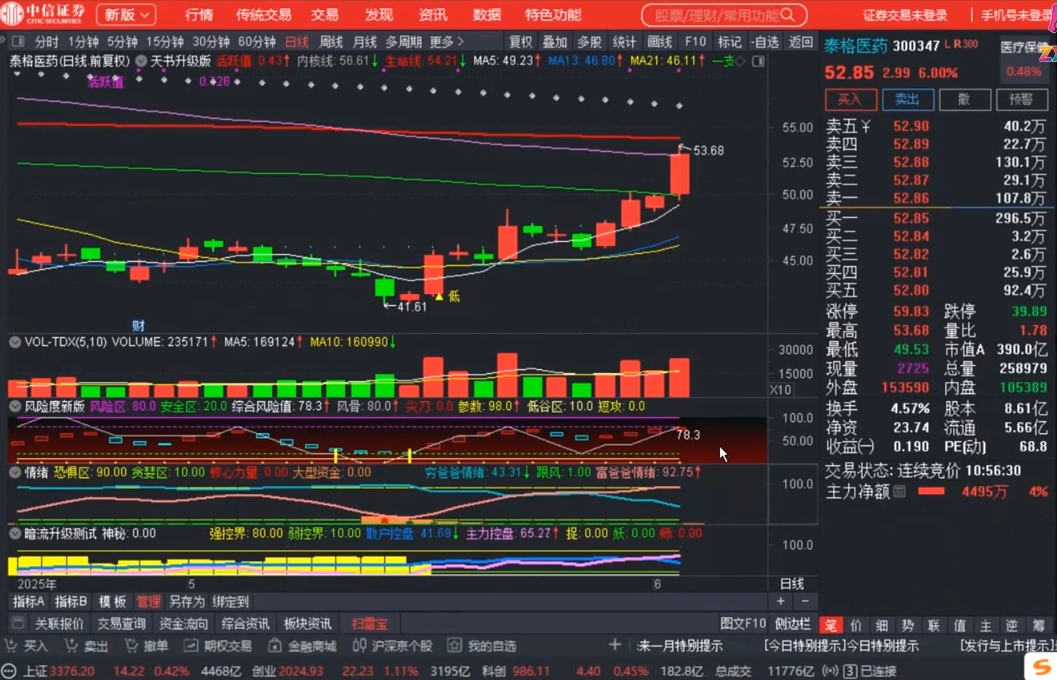



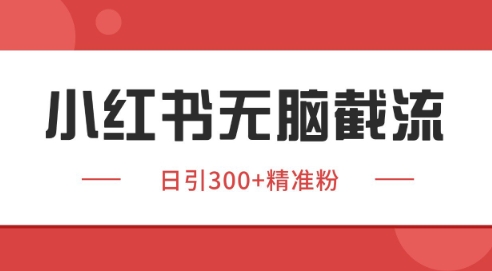

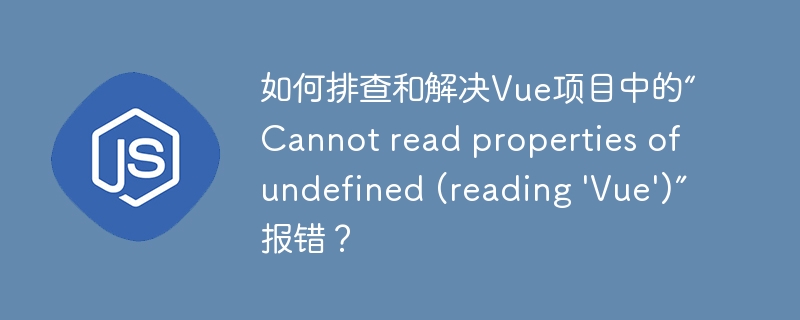
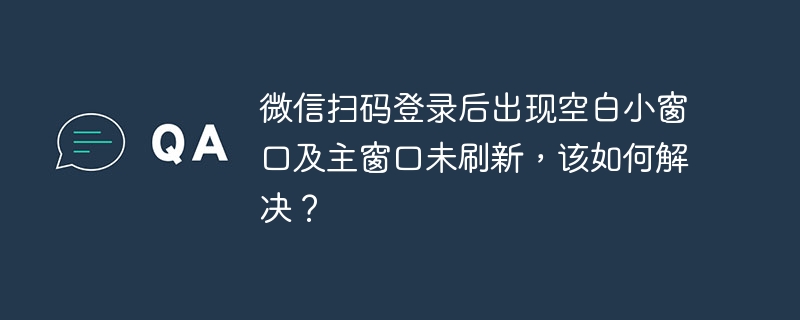





.png)
